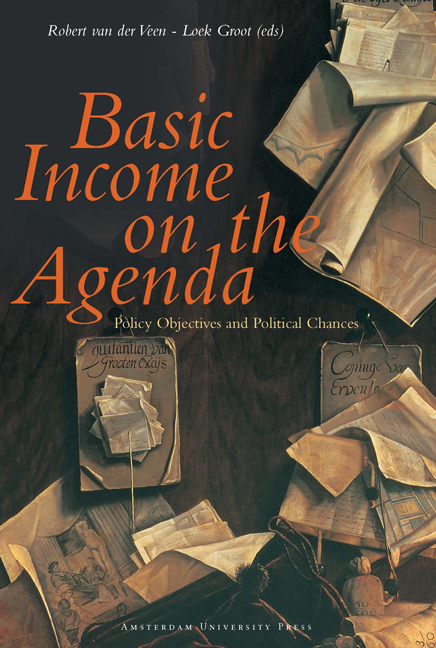Clues and Leads in the Debate on Basic Income in the Netherlands
Published online by Cambridge University Press: 23 January 2021
Summary
Introduction
This is an account of the political significance of twenty years’ worth of discussions around the theme of unconditional basic income in the Netherlands. In the Introduction, the question was raised of whether basic income has ever been on the ‘political agenda’, and what the chances are of its eventual introduction. We start out by briefly summarizing our findings. Basic income entered the arena of public debate as an ethically inspired reform proposal, to make available the social minimum income unconditionally to all Dutch citizens, for emancipatory reasons in a climate of relative abundance. Political interest in the idea, however, has proved to have been largely dependent on the rate of unemployment. The basic income idea gained a broad social appeal as an alternative socio-economic strategy, when major unemployment hit the country in the early eighties. But the literature we reviewed shows that the fate of basic income has also been determined by a lack of acceptance of its most radical feature: strict unconditionality with respect to work. Public discussions have always strongly focused on this aspect (‘the decoupling of work and income’). Thus, proposals for a basic income openly defended in this radical form have never been able to mobilize any lasting political support in the Netherlands. Less far reaching versions of partial basic income (meant to replace only part of the social minimum in unconditional form) have fared somewhat better in terms of political acceptance, but have been rejected in the end as well, probably due to their association with the radical thesis of ‘decoupling’.
After the Dutch economy began to pick up from 1987 onwards, and unemployment decreased just as spectacularly as it rose four years earlier, public discussions of basic income underwent a major change of context. Instead of being put forward as a full-fledged institutional alternative, basic income specifically came to address the exclusion of marginalized people, where ‘exclusion’ was understood as income poverty and lack of employment chances. In this context, the argument for unconditional subsidies was mainly located in its inclusion effects, both by boosting employment at levels under the minimum wage, and by allowing precarious workers to share at least minimally in the benefits of an affluent society. This change in emphasis meant that basic income was now discussed as an instrument for re-inserting the lowly productive members of the labour force, rather than making everybody independent from toil.
- Type
- Chapter
- Information
- Basic Income on the AgendaPolicy Objectives and Political Chances, pp. 197 - 223Publisher: Amsterdam University PressPrint publication year: 2000
- 9
- Cited by



